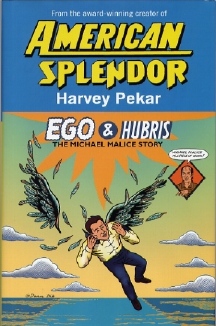 |
 Harvey Pekar
Harvey Pekar
Ego & Hubris: The Michael Malice Story
Reviewed by: Rick Kleffel © 2006
Art by Gary Dumm
Ballantine Books / Random House
US Hardcover First Edition
ISBN 0-345-47939-4
Publication Date: 04-11-2006
152 Pages; $19.95
Date Reviewed: 04-19-06
Index:
General Fiction
Non-Fiction
We love to love the unlovable. The schmoe, the schmuck, the geek, the dweeb, the raging jerk -- we can't seem to get enough of them, so long as they aren't actually in our lives. In fiction and biography, at that comfortable distance, we find few humans more fascinating than those humans we'd least like to deal with on a daily basis. The books and works that take them apart and put them back together for us are as fascinating as the actual people of that ilk we are unfortunate enough to know are frustrating. Harvey Pekar, who has done more for getting at the realities of American life than most writers, gets his own share of a quintessential twit in 'Ego & Hubris'. Pekar not only gets his share -- with the able help of Gary Dumm's art, he shares his experience with readers. Pekar does not mince words, yet what he says right here on the front cover of the book -- "Michael Malice is a piece of work!" -- is something of an understatement. Pekar's potted biography of this alas all-too-normal, self-absorbed thirty-something writer is compelling, funny, disturbing and ultimately rather compassionate.
'Ego & Hubris' tells the life-story, thus far, of Michael Malice, who is known for his two websites, overheardintheoffice.com and overheardinnewyork.com. While it's certain from the outset that eventually Malice will meet Pekar, the story is told from Malice's point of view from childhood onward. He lives up to his odd name, starting with his first utterance -- "I was raised as a dog." It's not that Malice was mistreated, at least as he tells it. It's more that he was not accorded the kind of respect that most of us have to earn. But the story here is considerably more complex and oblique than simple summary is going to convey.
Pekar tells that story in an appropriately complex manner. Malice in the present stands in the frame as he describes the indignities endured by Malice in the past. From the get-go Malice manages a high opinion of himself. We learn his (according to him, high) IQ almost immediately, and in case we don’t have a photographic memory, he often reminds us that he does, unless, of course, he's whinging about not being able to remember something. And it's this collision that embodies Malice. Time after time he claims to be one thing then something else. Or he'll do one thing then espouse a philosophic viewpoint in opposition to what he has just done. He acts like a liberal in many ways, yet he's a Republican, a fact he emphasizes though he never tells us why.
Pekar relentlessly and ruthlessly tells Malice's story with no affect. None is necessary. Gary Dumm's illustrations consistently show Malice to be transparent when those around him have form and heft. Because Pekar himself plays only a small part in this story, it's a rather large departure for the usually self-reflective writer. Adding to that is the fact that this is essentially one long biography-so-far of a not-so-likeable young man. Those looking for the usual episodic slices-of-life will find themselves in the midst of a larger work. Oh, Malice is clever, all right, and quite self serving. 'Ego Hubris' is a fascinating exercise in anti-empathy.
One of the perks of being as established as Pekar is that editors now allow this talented writer a lot more leeway in his work. Michael Malice is indeed "a piece of work," but as Pekar's work progresses, readers will uncover what is interesting to both Pekar and by extension, the reader. Malice's talent for self-contradiction is an unsung element of the everyday American life that Pekar loves to examine. By virtue of his zippy storytelling style and Gary Dumm's illustrations -- indeed by the virtues of the comic book form that Pekar loves -- we're allowed to get a glimpse of a bigger bit of ourselves than most of us are willing to admit. Pekar's sparse, simple prose is in direct contrast to the very complex storytelling style he uses in 'Ego & Hubris'. His incredible achievement is to make that complex style as transparent as Dumm renders Malice. Popping back and forth between the past and present, the downtrodden and the high and mighty, combining in a single frame different versions of the same man at different times, Pekar himself achieves with this work what Malice himself in fact is. 'Ego & Hubris' looks simple, reads quickly but is complex and cutting.
As much as we want to love the unlovable Michael Malice, by the end of the book, that's not really possible. Besides, it's clear that he loves himself enough for the all of us. However, with the help of Pekar, Dumm and even Malice himself, this biography might help readers to connect with their own inner jerk. And once we do that, well, perhaps Malice doesn't seem so bad after all. In the end, even Michael Malice gets a happy ending, tinged by an Ayn Rand sunset. 'Ego & Hubris' is Pekar's first big venture beyond the realm of auto-biography. We want to love this unlovable jerk, this Michael Malice. But even if we don’t, we can certainly love the way that Pekar tells his story -- and ours.
|
 |
